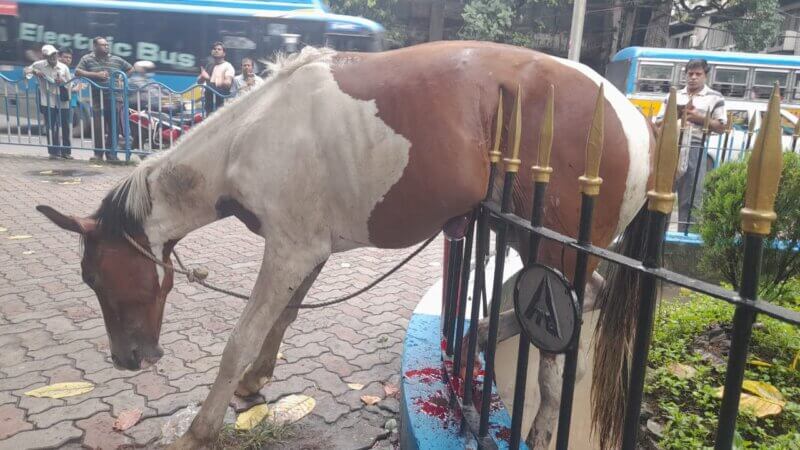Horse Impaled on Fence at Maidan – Police File FIR After PETA India’s Complaint
Kolkata police registered a first information report (FIR) upon receiving a complaint from PETA India after a 2-year-old horse became impaled on a fence at the Maidan, reportedly as he was trying to access food, sustaining a large wound to his stomach, through which his intestines spilled out. The FIR was filed according to Indian Penal Code sections 289 (for negligent conduct with an animal causing risk to human life, as the horse posed a risk to pedestrians and vehicular traffic) and 429 (for the maiming of an animal, in this case through neglect) and The Prevention of Cruelty to Animals (PCA) Act, 1960.
In the complaint, PETA India details that after learning of the injury, Radhika Bose, head of the CAPE Foundation, contacted the West Bengal Animal Resources Development Department (ARDD) and the police seeking their urgent assistance. Officers directed that the horse be taken to Belgachia Veterinary Hospital, as no ARDD veterinarian came forward to treat the horse on site. Accordingly, the horse was loaded onto a truck and transported to the hospital (which is about 10 kilometres away from the site of the incident) without being given any sedatives, worsening his condition and causing him extreme suffering.
Bose requested the urgent assistance of Dr Amit Lonarkar, a veterinarian who had looked after unhealthy horses confiscated from the carriage trade and placed under PETA India’s care. The hospital – which had no surgical instruments, suture materials, anaesthetic, or painkillers – was ill-equipped to handle the horse.
Lonarkar found the horse in a recumbent position with a ruptured rectum and ruptured intestines that were hanging outside his body. The horse had lost a tremendous amount of blood due to the delay in veterinary care and was still bleeding profusely. Furthermore, his eviscerated intestines were contaminated, as he had been left lying on the ground at the Maidan, which was strewn with horse faeces.
Lonarkar relieved the horse of his suffering through compassionate euthanasia in accordance with Section 13 of the PCA Act, 1960, in the presence of police officers from Maidan Police Station and with the consent of the owner.
In May, the Calcutta High Court ordered that 16 horses identified as “unfit” by the ARDD during a medical inspection camp conducted in accordance with an order of the court be handed over to PETA India for interim care, because the ARDD lacks any suitable facility to treat the animals itself. Yet only nine horses were transferred to PETA India, including one who was in such poor shape that she remained largely recumbent until she died. Of the other horses placed under PETA India’s care, some are totally blind, visually impaired, or suffering from irreversible leg conditions due to being forced to work on hard roads, and one immediately gave birth. It can be assumed the horses who were not handed over for care are in equally poor health yet are presumably still compelled to pull tourist carriages.
View this post on Instagram
Earlier this year, after seeing the plight of horses used for hauling tourist carriages in Kolkata or reviewing materials regarding their condition, over 150 veterinarians sent an appeal to Chief Minister of West Bengal Mamata Banerjee requesting that her government end the use of horse-drawn carriages in consideration of the animals’ poor health and deteriorated condition.
Horses who are limping, visually impaired, or otherwise unhealthy pose an additional traffic hazard beyond the risk already created by horse-drawn carriages. PETA India has compiled a factsheet on numerous road accidents in Kolkata involving horses, illustrating the dangers of using them to haul tourists.
Through public interest litigation, PETA India has appealed to the Calcutta High Court to prohibit the use of horses for rides and hauling carriages. In Mumbai, horse-drawn carriages have been replaced with sleek, vintage-style, non-animal vehicles. PETA India has written to the ARDD expressing disappointment over the department’s poor handling of the impaled horse incident and failure to hand over all horses identified through the department’s camp as in need of help, reiterating its demand for horses to be replaced with motorised e-carriages.









